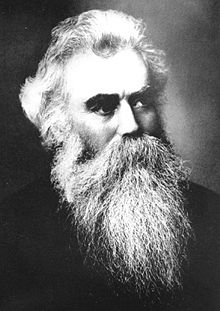- Charles Edwin Wilbour
-
Charles Edwin Wilbour 
Born March 17, 1833
Little Compton, Rhode IslandDied December 17, 1896 (aged 63) Resting place New York City Education Brown University Occupation Egyptologist Spouse Charlotte Beebee Charles Edwin Wilbour (March 17, 1833 – December 17, 1896) was an American journalist and Egyptologist. He was one of the discoverers of the Elephantine Papyri. He produced the first American translation of Les Misérables.
Contents
Biography
He was born in Little Compton, Rhode Island, on March 17, 1833. He received a classical education and entered Brown University, where he took a prize for proficiency in Greek and was noted for his thorough acquaintance with the ancient and modern languages, but was not graduated, owing to delicate health. Having taught himself shorthand, when he had sufficiently recovered, he went to New York City in 1854 and became connected with the Tribune as a reporter. He also studied law and was admitted to the bar in 1859. The following eighteen years were devoted to literary and journalistic work. In 1872, he began the study of Egyptian antiquities and visited the principal libraries of the United States and Canada. Wilbour also owned a major paper manufacturing company, which eventually involved him in the events leading to his voluntary self-exile. He obtained many city contracts apparently dealing with Tammany Hall in the heyday of the Tweed Ring. With the fall of William M. Tweed in the early 1870s, Wilbour decided to leave the United States. In 1874, he went abroad and spent much time consulting the archaeological treasures of the British Museum and the great libraries of the continent. He then became a co-laborer with Heinrich Karl Brugsch and Gaston Camille Charles Maspero in the field of Egyptology, accompanying the latter on five winter exploring expeditions up the Nile. In 1889 Mr. Wilbour continued to travel in Egypt, using his own dahabeeyah, or Nile boat. On a visit to Aswan he purchased some papyrii dug up on the island of Elephantine by local people. He did not realise the importance of his find and when he died in a hotel in Paris his belongings, including the papyrii, were put in storage by the hotel and not returned to his family for nearly half a century. At the request of his widow, they were donated to the Brooklyn Museum.
Wilbour published "Rachel in the New World", from the French of Leon Beauvallet, with John W. Palmer (New York, 1856); and translated Victor Hugo's Les Miserables (1862–1863); he also published The Life of Jesus, from the French of Ernest Renan (1863).[1]
His wife, Charlotte Beebee, was born in Norwich, Connecticut, on March 2, 1830, was educated in Wilbraham, Massachusetts, and married Mr. Wilbour on January 18, 1858. She was elected president of Sorosis in 1870 and five times re-elected. She was a founder of the club, devoted much time and thought to securing for it a permanent foundation, and was instrumental in organizing the Association for the Advancement of Women that was formed by it in 1873. She instituted lectures on health and dress reform, suggested and aided in preparing entertainments for various purposes, and assisted many women in obtaining public recognition. Despite living outside America, she maintained her interest in the elevation of her sex and sought every opportunity to labour for it.[1]
Legacy
The Wilbour Library of Egyptology in the Brooklyn Museum is named for him as is Wilbour Hall and the Charles Edwin Wilbour Professorship at Brown University.
References
- Wilson, John A. Signs and Wonders Upon Pharaoh: A History of American Egyptology (Chicago, London: The University of Chicago Press, c1964), 243p., illus. P.99-109, Ch. 6. "The Houseboat on the Nile (1880–1908) deals with Wilbour's career in Egypt, and mentions his involvement with Tweed.
External links
- Charles Edwin Wilbour at Findagrave
- Rose, Mark, "Wilbour's Legacy", Archaeology, August 18, 2005
This article incorporates text from the public domain Appletons' Cyclopædia of American Biography.
Categories:- 1833 births
- 1896 deaths
- American Egyptologists
- American journalists
- Brown University alumni
Wikimedia Foundation. 2010.
